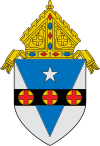Joseph McShea
Joseph McShea | |
|---|---|
| Bishop of Allentown | |
| Church | Roman Catholic Church |
| See | Allentown |
| In office | 1961–1983 |
| Predecessor | none |
| Successor | Thomas Jerome Welsh |
| Orders | |
| Ordination | December 6, 1931 |
| Consecration | March 19, 1952 |
| Personal details | |
| Born | February 22, 1907 Lattimer, Pennsylvania |
| Died | November 28, 1991 Allentown, Pennsylvania |
| Previous post(s) | Auxiliary Bishop of Philadelphia (1952–1961) |
Joseph Mark McShea (February 22, 1907 – November 28, 1991) was an American prelate of the Roman Catholic Church. He served as Bishop of Allentown from 1961 to 1983.
Early life and education[]
Joseph McShea was born in Lattimer, in Luzerne County, Pennsylvania, one of seven children of Roger A. and Jeanette (née Beach) McShea. He received his early education at the parochial school of Transfiguration of Our Lord Church in Philadelphia.[1] He graduated from West Philadelphia Catholic High School for Boys in 1923, and then began his studies for the priesthood at St. Charles Borromeo Seminary in Overbrook.[2]
In 1926, he was sent to continue his studies in Rome at the Pontifical Roman Seminary and the Pontifical Lateran University. He earned a doctorate in theology in 1932.[1]
Priesthood[]
McShea was ordained a priest by Cardinal Francesco Marchetti Selvaggiani on December 6, 1931.[3] His first assignment, following his return to Pennsylvania, was as a professor at St. Charles Borromeo Seminary, where he taught Latin, Italian, and history (1932–35).[1] From 1935 to 1938, he served as a minutante of the Congregation for the Oriental Churches in the Roman Curia. He then returned to the United States, where he served as secretary of the Apostolic Delegation in Washington, D.C. (1938–52). He was named a papal chamberlain in August 1938, and raised to the rank of domestic prelate in April 1948.[2]
Episcopacy[]
On February 8, 1952, McShea was appointed auxiliary bishop of the Archdiocese of Philadelphia and titular bishop of Mina by Pope Pius XII. He received his episcopal consecration on the following March 19 from Archbishop Amleto Giovanni Cicognani, with Bishops Eugene J. McGuinness and William David O'Brien serving as co-consecrators, at the Cathedral of SS. Peter and Paul.[4] He selected as his episcopal motto: Sub Umbra Petri ("In the Shadow of Peter").[1] As an auxiliary bishop, he served as pastor of St. Francis de Sales Church in Philadelphia.
McShea was appointed the first Bishop of the newly erected Diocese of Allentown by Pope John XXIII on February 11, 1961.[3] His installation took place at the Cathedral of Saint Catharine of Siena on April 11 of that year.[4] In 1953, he was appointed president of the American Catholic Historical Society.[5]
Between 1962 and 1965, McShea attended all four sessions of the Second Vatican Council in Rome.[4] During the Council, he was one of 18 American bishops elected to the 10 commissions that facilitated the Council's work, and served as relator for the Commission for Religious.
McShea founded "Operation Rice Bowl" which began in the form of a small cardboard box in the parishes of the diocese to receive alms directed to relieving a famine in Africa. In 1976 it was adopted by the United States Conference of Catholic Bishops as a national program, and the following year assigned to Catholic Relief Services.[6]
He helmed the founding of Holy Family Manor, a nursing and rehabilitation center at the former Eugene Grace mansion in Bethlehem, Pennsylvania.[7] He also established Holy Family Villa, a retirement home for priests. He convened the first diocesan synod in May 1968. In 1969, he sued the board of directors of Sacred Heart Hospital to prevent a corporate merger with Allentown Hospital during the formation of the Allentown-Sacred Heart Hospital Center, in an effort to maintain the Catholic identity of Sacred Heart.
During his 22-year tenure, he oversaw the construction, purchase, and renovation of over 300 church buildings. In 1964, McShea, together with the Oblates of St. Francis de Sales, founded Allentown College (currently known as DeSales University).[8]
After reaching the mandatory retirement age of 75, McShea resigned as Bishop of Allentown on February 3, 1983.[4] McShea, long ill from diabetes and other ailments, later died at age 84, and is buried on the cathedral grounds.[9]
References[]
- ^ a b c d Callahan, Aloysius (2006-01-26). "Bishop McShea's Vision for Allentown College...40 Years Later!" (PDF). DeSales University.
- ^ a b Curtis, Georgina Pell (1961). The American Catholic Who's Who. Vol. XIV. Grosse Pointe, Michigan: Walter Romig.
- ^ a b "Retired Allentown Bishop Dies", AP, November 30, 1991
- ^ a b c d "Bishop Joseph Mark McShea". Catholic-Hierarchy.org.[self-published source]
- ^ O'Donnell, George E. "Our New President", Records of the American Catholic Historical Society of Philadelphia, vol. 63, no. 4, 1952, pp. 195–196. JSTOR
- ^ Brown, Louis. "What is Operation Rice Bowl?", St. Anne Roman Catholic Church, Pensacola, Florida, February 8, 2019
- ^ Holy Family Manor
- ^ "History". DeSales University.
- ^ "Diocese of Allentown Celebrates 60th Anniversary", ADToday, Jan 27, 2021
- 1907 births
- 1991 deaths
- St. Charles Borromeo Seminary alumni
- Roman Catholic bishops in Pennsylvania
- Roman Catholic Ecclesiastical Province of Philadelphia
- Roman Catholic Diocese of Allentown
- Participants in the Second Vatican Council
- 20th-century Roman Catholic bishops in the United States

